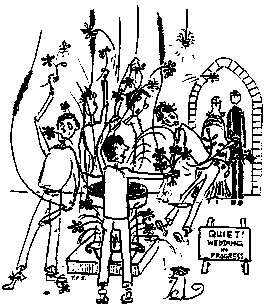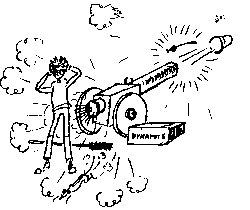The Tower Handbook
9.5: Wedding ringing
a: When should we ring for weddings?
 Some towers ring before and after the service, others only ring afterwards. Stick with local custom if everyone is happy with the way things work. Ringing before and after takes up more time, especially for a single wedding.
Some towers ring before and after the service, others only ring afterwards. Stick with local custom if everyone is happy with the way things work. Ringing before and after takes up more time, especially for a single wedding.
If you have a wedding every hour as some churches do, then all but the first couple get ringing before anyway, unless the previous service finished early.
If you only ring after the service then someone has to raise the bells beforehand unless your band is competent to do it tidily as the couple emerge from the church.
b: Who should ring for weddings?
If you can pick and choose who rings, because you have plenty of ringers and wedding ringing is seen as a perk, then the normal choice is those who attend most regularly on a Sunday. If you have fewer ringers who see turning out for weddings as a chore, then you pick whoever is willing and use persuasion to make up the numbers. If you are really short, you may have to import ringers from another tower, but you can't expect to do this all the time. If on some occasions you cannot man all the bells, then ringing the back six (say) is acceptable providing this is agreed in advance with the church authorities, and the wedding couple has not been promised a specific number of bells.
c: What should we ring for weddings?
You are being paid for the ringing so it should be good. Always ring well within the capabilities of the band. If you rely on youngsters as the main source of wedding ringers [103] this may limit what you can ring, but don't worry. Twenty minutes of well struck call changes is very acceptable for a wedding if you can't ring anything more ambitious. The wedding party will have a lot to think about. They will be happy if there is some pleasant sounding ringing in the background .
d: What is firing?
 Striking all the bells (almost) at the same time, from the tenor upwards. They strike so closely that the sound is a single roar.
Striking all the bells (almost) at the same time, from the tenor upwards. They strike so closely that the sound is a single roar.
Some bands fire for weddings but not all and there are different ways of including it. Some start by firing three times and then switch into normal ringing (Queens or rounds) for the rest of the time. Others ring rounds and fire when called, until called back to rounds. This may be repeated several times.
Firing is quite difficult to do well, but like most things you get better if you practise regularly. Because the bells strike so close together, the striking has to be pretty accurate or you lose the effect. With the second method described, there is the additional problem for most of the bells to hold up while the tenor strikes and then strike accurately in the cadence.
e: Who should organise weddings?
Traditionally the secretary, but many tower captains organise weddings themselves. If you have a lot of weddings, perhaps another of your members could undertake the task to relieve the load . The important thing is that whoever does it will be reliable and will ensure that communication with all affected parties is effective. Remember that you are providing a paid service at a very important point in someone's life.
f: How should we organise weddings?
- Plan ahead.
If your church has a rolling wedding plan, make sure you receive a copy every time it is updated. Make sure your priest, parish secretary (or whoever books weddings) knows when you can't provide a band. For example, most churches will let you have a Saturday off to go on your outing, providing you tell them before they book a wedding on that day.
- Make sure what is required.
Some couples will have the full set of 'organ, choir, bells and flowers', but not all. Even worse, some change their minds after making the arrangements. Make sure you are kept informed of any changes.
- Make sure you have enough ringers who know they are ringing.
People mostly get married in the summer which is also when ringers go on holiday. The sooner you get ringers to sign up to weddings, the sooner you will find out whether you are going to run short. Then you will have time to try to obtain help from other towers.
- Make sure the bells are ready.
There have been (rare) incidents where the ringers arrived only to find the steeple keeper had removed the ropes for repairs unaware that there was any ringing. More practically, if your bells are normally down, they need raising. If you ring before the wedding as well as after this is no problem, but raising confidently in peal as the couple walk out of the church may be beyond the ability of the band ringing for the wedding, in which case you need to arrange for someone to raise the bells earlier in the morning. You may give a slightly increased wedding fee to the person who does this.
- Make sure the right money is in the right place at the right time.
If you are lucky the verger brings a bag of money after the wedding. If you are paid quarterly by cheque, you will need to obtain money from your funds. Make sure you have enough change, especially if your fee is an awkward amount like £4.50. The day you arrive with a bundle of £10 notes will be the day no one has any change.
g: How much should we get paid for weddings?
You must agree the fee with your church authorities. How you split it between your ringers and how and your funds is your decision. The payment to each person may influence whether they are prepared to give up part of a Saturday afternoon. The residue for the tower may be the main input to your funds. See section 7.7b.
h: What happens if wedding ringing is cancelled?
Weddings do sometimes get called off, perhaps only just before the wedding day. You probably arrange the band to ring week or two in advance, so you need good communication with the responsible church authorities to ensure you don't turn up to ring for a non existent wedding. Some couples have even cancelled the bells a couple of days before their wedding on the grounds that they could not afford them! The church can forestall such problems by insisting on pre-payment, at least of a deposit, to deter last minute changes (such changes can greatly inconvenience ringers who may have sacrificed other plans in order to ring).
i: Should we pay tax on wedding money?
At one time no one would ask such a question, but it has been asked recently.
Whether there is a technical liability or not, it appears it would not benefit the tax man to enforce it. If wedding ringing were deemed to be the provision of professional services, then the fee would be taxable. But then expenses occurred in connection with the profession could be legitimately set against tax. The payment is relatively small in professional terms and in many cases the expenses incurred in acquiring the necessary skill, and then travelling to perform the ringing could be greater. Tax is a means of raising revenue and it becomes unproductive if it costs more to collect than it raises. We don't think you need worry about this (but in matters of taxation all things are possible).
Previous

 Next
Next
Currently hosted on jaharrison.me.uk
 Some towers ring before and after the service, others only ring afterwards. Stick with local custom if everyone is happy with the way things work. Ringing before and after takes up more time, especially for a single wedding.
Some towers ring before and after the service, others only ring afterwards. Stick with local custom if everyone is happy with the way things work. Ringing before and after takes up more time, especially for a single wedding.  Striking all the bells (almost) at the same time, from the tenor upwards. They strike so closely that the sound is a single roar.
Striking all the bells (almost) at the same time, from the tenor upwards. They strike so closely that the sound is a single roar.